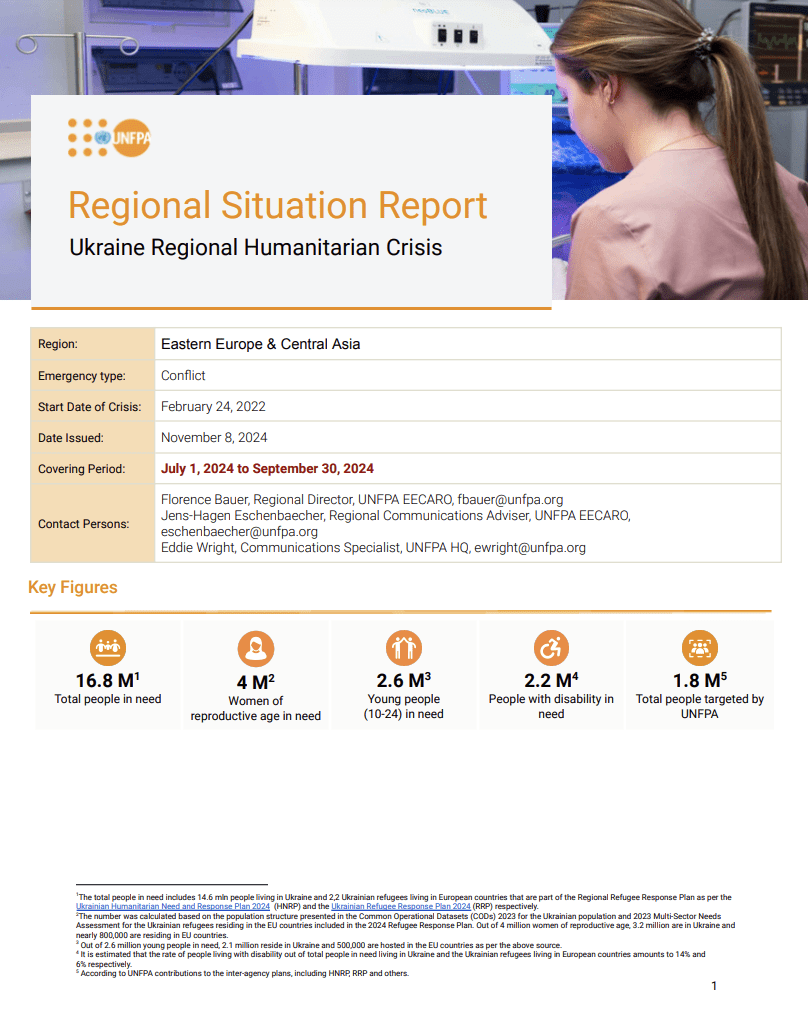
Resources
Ukraine Situation Report #25 - November 2024
Resource date: Nov 2024
Author: UNFPA Ukraine / UNFPA EECARO

Resources
Resource date: Nov 2024
Author: UNFPA Ukraine / UNFPA EECARO
The escalation of hostilities in Ukraine has created a far-reaching humanitarian crisis. As of September 2024, 6.7 million people have fled Ukraine, with 93 per cent seeking refuge in EU countries, while 3.7 million remain internally displaced due to ongoing conflict. Civilian casualties have surged, with July recording the highest toll since 2022, and widespread attacks severely damaging residential areas, health facilities, and infrastructure in cities like Kyiv and Dnipro, including Ukraine’s largest paediatric hospital. Hostilities in eastern regions have further devastated homes, schools, and healthcare facilities, while attacks on energy infrastructure disrupted basic services for thousands. Humanitarian efforts face mounting risks, with aid workers targeted and WHO documenting a record 1,940 attacks on healthcare since the invasion began. Health remains a critical issue for refugees, with 31 per cent identifying it as an urgent need, particularly in Moldova, Romania, and Slovakia. Amid these challenges, Ukraine’s population has declined by over 10 million since 2014, prompting the adoption of a UNFPA-supported Demographic Strategy to address severe human capital depletion and foster opportunities for all Ukrainians.
In response to this crisis, UNFPA has provided sexual and reproductive health (SRH) services to over 330,000 individuals and gender-based violence (GBV) prevention and response support to nearly 100,000 people, with a primary focus on Ukraine. Key initiatives include training first responders at a new simulation centre in Poltava, launching youth resilience and mental health programmes, and enhancing GBV services through renovated facilities in Dnipro and Kramatorsk. In neighbouring countries, UNFPA has strengthened healthcare systems by providing financial health coverage for Ukrainian refugee women in Moldova and donating essential medical equipment. Safe spaces for women and girls have been established in Belarus, while in Romania, access to SRH and GBV services has been expanded through initiatives like the Safe You app. In Poland, the “Living Library” initiative empowers survivors to share their stories, fostering greater awareness and support.
Despite these efforts, UNFPA faces a US$ 44 million funding gap out of the US$ 105 million required to sustain its operations. This shortfall threatens the continuation of vital services, including SRH care, GBV response, and youth support programmes, particularly for vulnerable populations in conflict-affected areas. Without additional funding, millions of women, girls, and young people may lose access to critical resources that ensure their safety, dignity, and well-being.